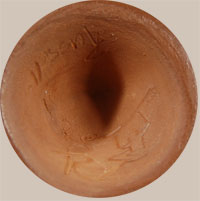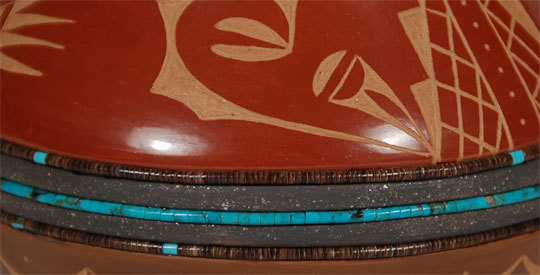San Ildefonso Multi-colored Contemporary Jar with Hieshe [SOLD]
+ Add to my watchlist Forward to Friend
- Category: Modern
- Origin: San Ildefonso Pueblo, Po-woh-ge-oweenge
- Medium: clay, turquoise, shell
- Size: 6” tall x 4-3/8” diameter
- Item # 25552 SOLD
 Russell Sanchez is unquestionably one of the most talented and creative of the current pueblo potters. He explained to me that he experimented with firing techniques until he determined a proper temperature to achieve what he was looking for. As a result, he fires his pottery at a much higher temperature, maybe 1800 degrees F., whereas the normal is only around 1100 or 1200 degrees. This results in a much harder surface to the vessel, thus eliminating chances of spalling because any impurities have been absorbed into the clay from the hot firing. He says that his vessels could hold water as the older vessels did because of the firing technique (but I would not try it). The pottery, he says, actually achieves a red-hot appearance during the firing.
Russell Sanchez is unquestionably one of the most talented and creative of the current pueblo potters. He explained to me that he experimented with firing techniques until he determined a proper temperature to achieve what he was looking for. As a result, he fires his pottery at a much higher temperature, maybe 1800 degrees F., whereas the normal is only around 1100 or 1200 degrees. This results in a much harder surface to the vessel, thus eliminating chances of spalling because any impurities have been absorbed into the clay from the hot firing. He says that his vessels could hold water as the older vessels did because of the firing technique (but I would not try it). The pottery, he says, actually achieves a red-hot appearance during the firing.
Because of the hotter firing, the surface of the pot is much harder, so any sgraffito carving must be performed before firing because of the hardness. Most sgraffito artists carve after firing. In this instance, Sanchez carved the details of the rain clouds and other designs before firing. He used multiple colored slips. The inside of the rim is tan slip, the upper body is red slip, the lower body is brown slip and the rim is painted with micaceous black slip. After the firing process, Sanchez inserted a row of turquoise hieshe and two rows of shell hieshe at the mid body of the vessel. The underbody is concave and that is where he signed his name.
Condition: new and in original condition
Provenance: from the artist
Recommended Reading: Art of Clay: Timeless Pottery of the Southwest by Lee Cohen

- Category: Modern
- Origin: San Ildefonso Pueblo, Po-woh-ge-oweenge
- Medium: clay, turquoise, shell
- Size: 6” tall x 4-3/8” diameter
- Item # 25552 SOLD



